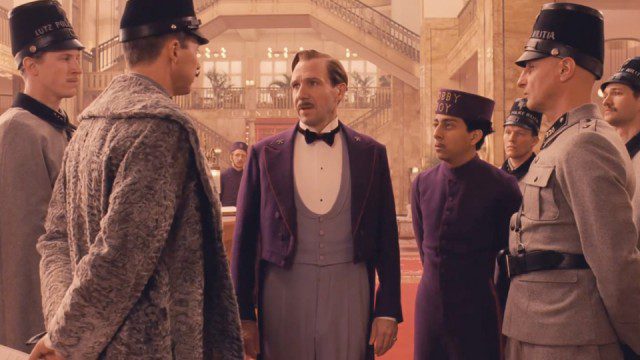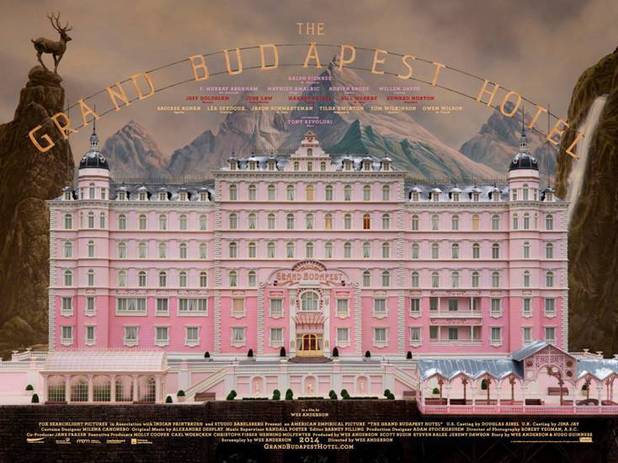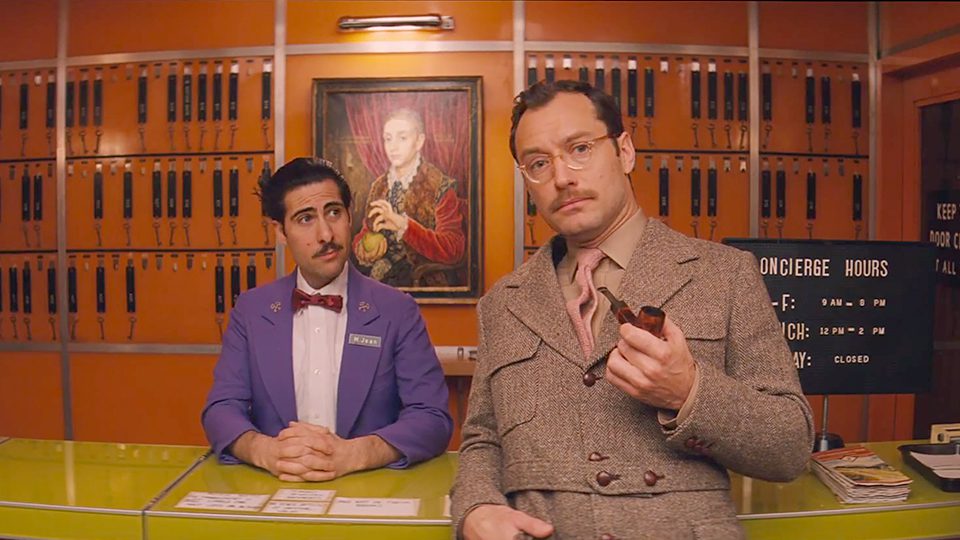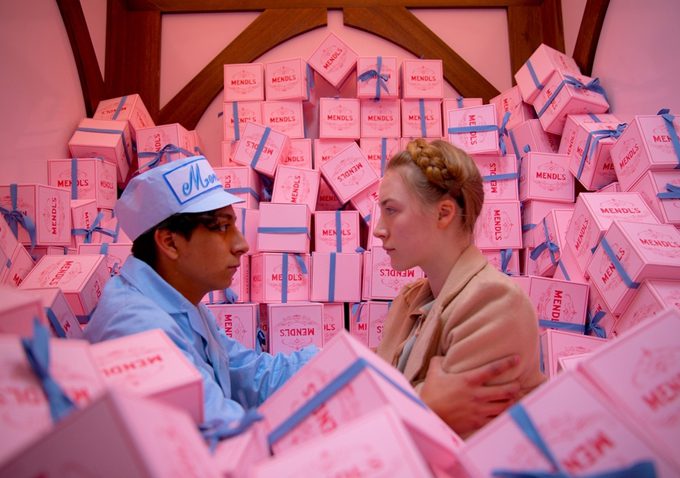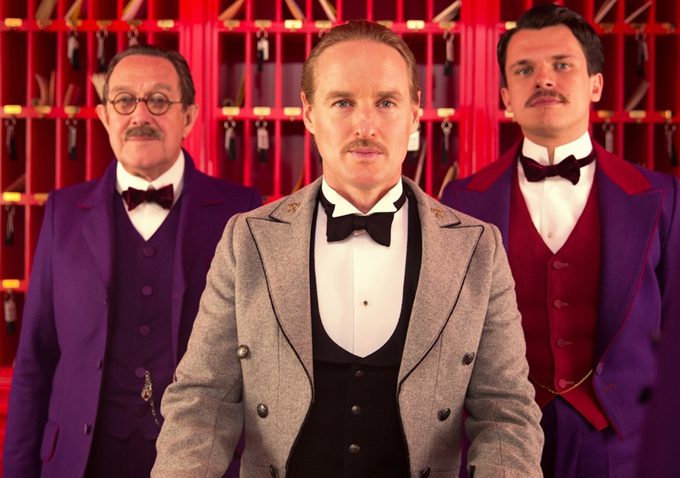In “The Grand Budapest Hotel” we discover a particular shop, Mendel’s, whose sole culinary creation plays a pivotal role in the film. Characters in every level of this faux-eastern European locale’s society know what the little pink box and the name Mendel’s represents, and anticipate the same glorious confection they can expect inside. The box’s walls come together and complete a perfect pink cube around the stacked balls of pastel-iced pastry as the young apprentice chef Agatha (Saoirse Ronan) elegantly ties the knot of the ribbon on top. The name, the aesthetic quality of the storefront, the product and its packaging, have a definitive meaning for the characters. The pastry and its genesis proves utilitarian throughout the film. The shop provides shelter to our main character Zero in a time of crisis; the pastry provides the grease necessary to win important friends, to disguise the surreptitious passage of needed items and distract obstacles to the characters’ plans at opportune moments. That Mendel’s and its sweet product resembles the titular hotel is no small coincidence or mere side effect of director Wes Anderson’s love of spring palettes. Zero found his greatest loves in these two places- Agatha, and his friendship with M. Gustave (Ralph Fiennes), under whose tutelage he came to appreciate a civil foundation of behavior swiftly withering away in the WWII-era of the film.
Wes Anderson’s latest picture has inspired, as every new film in his ouvre consistently does, a polarized division of audiences. Throughout his career he has channeled his style through the various worlds of a prep school, New York cool, filmmakers on an open-sea adventure, the country and culture of India, and small-town New England. Yet for those who despise him, his devotion to offbeat characters with their behavioral tics and delayed adolescence, and his idiosyncratic visual style (the geometrically precise framing, the neat arrangement of antiquated bric-a-brac, the bright color schemes) are just repetitious and infantile like his characters, who he is incapable of seeing as annoying, disgruntled, and mired in self-perpetuated ennui. These same people also despise the fans of Anderson and those aspects of his films they perceive as continuous with the contrary-cool culture that idolizes him. For the haters, fans of Wes Anderson are like over-grown children at the circus, denying reality to persist in their love of an elegant sleight-of-hand. He, like Mendel’s, is essentially making the same luxury confection over and over again to appease a crowd that wants to glutton themselves on it over and over again, without ever trying anything new. For his fans, and I count myself among them, these confections have a lot more ingredients that deepen their content than the detractors are willing to admit.
The story of “Grand Budapest” revolves around Zero Moustafa, a refugee from a Middle Eastern country, looking for work at the Sweet-Sixteen-birthday-cake of a hotel, The Grand Budapest. It sits high on a mountain accessible only by a beautifully decorated, cantilevered lift and caters to the highest of society. Zero talks his way into a job as a bellboy, and falls under the wing of he hotel’s grand tutor: Fiennes’ Monsieur Gustave. M. Gustave is a debonair practitioner of Old-World social graces and courtesy who also “charms” and cares for old feeble women of great wealth who visit the hotel. This turns sour and the plot takes off when one of these old women (Tilda Swinton, a welcome new resident of the Anderson repertory) passes away and leaves him a priceless painting in the last addendum to her voluminous will, angering her heirs (including an evil, mustachioed Adrien Brody). What begins as a pupil/teacher relationship grows into a friendship that sustains them through the greatest period of their lives, which the elderly Zero tells in a flashback to a writer staying at the hotel decades after its halcyon days have ended. From its crumbling Moroccan steam baths to its crooked picture hanging behind the desk, what remains is the dilapidated grandeur of a once great palace worn down by various battles within and without its walls. (Anderson filmed interiors of the hotel in a long defunct German department store for the uberwealthy, complete with sweeping balustrades and majestic mile-wide staircases tailor-made for his purposes here). Along the way, we get everything out of this movie that one expects from a movie- danger, disaster, tragedy, and humor, all wrapped up in a perfect bow.
Though his films often quote his influences openly, the range of references on display in “Grand Budapest” rivals even Tarantino in its diversity and cheek. The call of the dogs from Disney’s “101 Dalmatians” is replicated in the spreading of a distress signal between members of a Secret Key society, made up of other stalwarts of the faded age and M. Gustave-types working in grand hotels across the continent (each with an amazing antique telephone and hotel uniform, and played by an Anderson regular). The stomping of Gustave’s hands, on the edge of a mountainside, by a twisted violent criminal comes right from Martin Landau’s gay thug in “North By Northwest.” There’s the painted backdrops of this mountainous locale reminiscent of Powell and Pressburger’s “Black Narcissus” to set us in this far away fantasy-land where the troubles of the world are not hidden by the style, but highlighted by it. Gustave’s penchant for old ladies with money, and the plot’s reliance on that character trait, reminded me of Chaplin’s “Monsieur Verdoux,” another work of artistic freedom that divided audiences. These quotations almost have the feel of a Terence Davies film, wherein music, dialogue and references to other movies forms a synaptic link between the emotions of those works, the emotions they evoked in the moment of their discovery by the filmmaker, and the emotions on display in the film quoting them. It is through this delving into cinematic fantasy that the reality of the characters is expressed.
Anderson’s characters never escape their fears and turmoil, they always must deal with them before they can find the path to fulfillment. That his films often end optimistically does not suggest that the problems presented in the story are themselves distant memories by movie’s end. “The Grand Budapest Hotel” is different in that the ending is bittersweet and melancholy, and we have the historical distance from the events of the film in the distinct bracketing of the story within a fictitious novel unlike that seen in “Royal Tenenbaums.” The film quotations remind us that we are experiencing the world as seen through the memory of an author, and hence is reflective of that author’s associations. As each of us observe art in any medium, we all have these associations- some element of one work of art invariably reminds us of another that potentially inspired it or that our minds link together. As such, I believe the fictitious author of the book within the film has embroidered his version of another’s story with outside influences acquired over time. We are not witnessing anything in the present in “The Grand Budapest Hotel”- the events of the film are not happening for the first time as we see them, they are still happening by virtue of memory consigned to the page. And memory is not often a perfect record, but one colored by experience and emotion.
Every Anderson film has a storybook construction, sometimes with a literal book and narration in the film to show us that this is a story with a concisely defined structure. In “Hotel” this structure is more fractured and reflexive than is normal for him, but in the end more perfectly rounded than ever before. Certain items and gestures have great significance which comes full circle in ways his previous films do not prepare us for. Rather than the emotionally charged presentation of singular items or creatures like the engraved swiss-army knife Dirk gives Max in “Rushmore,” or the revelation of the Jaguar shark in “Life Aquatic,” Anderson reveals the significance of elements we have seen as we move through the story, so that our minds connect back to the emphasized introduction of those items beforehand. The film opens with a young girl clutching a book, approaching a monument with keys hung about it. She hangs her own set of keys on the bust of the author, and sits down to begin reading his most famous work. From here the story proper begins, and time overlaps within its retrospect frame (it is not until the film is over that we recognize the significance of the girl’s gesture at the beginning). Jude Law plays the author as a young man, narrating the book for us, until he meets Zero, whom, he learns, owns the hotel yet has lived in the same small room for decades, refusing to exploit his status. At this point the narration switches from Law’s imagined voice in the present day scenario of the girl reading the book, and Zero’s voice narrating his own story to the author before the book was written. The perspective is not omniscient as in “The Royal Tenenbaums’ but first person. We are seeing the world through these characters, yet not entirely as a reconstructed past. The reverberating overlap of time is reflected in the hotel, which we see at the height of its opulence in Zero’s flashbacks, and in the degraded splendor and mid-century décor of the hotel in the author’s flashbacks. In each era within the film, we see the culture around the hotel encroaching on the values and ethics by which M. Gustave lived.
As the culture loses its interest in the sumptuous indulgences of old-world majesty, Zero’s still trys to keep a sense of dignity and tradition alive. His true inspiration however is simple- he loved his wife Agatha who loved the hotel, and he loved M. Gustave. As a good friend who saw the film with me noted, the summation of the perfect circle the story forms comes in its use of poetry. Throughout the film, Gustave’s recitations of poetry are humorously, and sometimes dramatically, cut off. He begins meals for his staff with poems that their ravenous appetites drown out, and are never read to completion. It’s an example of his effort to ensure that art and culture do not exist as the exclusive property of the hotel’s guests, but can enrich the lives of people at every level of society, of his belief in the commonality of art’s appeal and usefuleness. It is not until the end of the film that we hear an entire poem, when Agatha reads one, to quote my friend, “likening Zero and M. Gustave as to stars, one rising from the east, the other falling in the west. Yet for a moment they cross and brilliance radiates.” This plain and direct metaphor doesn’t hide it’s meaning or pretend to be clever, it just showcases the beautiful simplicity of their partnership before it is torn asunder by pseudo-Nazi thugs. Where earlier Gustave’s connections and poise ensured their safe passage on the train despite Zero’s questionable papers, Gustave’s spiel now only secures his demise.
Details like these make Anderson seem like a modern practitioner of Romantic philosophy to me. The Romantics sought a personal liberty from any system that inhibited our own truth, or inhibited the accessibility of artistic beauty from the common man. The humanity and artistry sparked by that wholeness of creative freedom invigorated every generation of people since that movement. Yet people who use this term to describe an artist whose work fits that bill have to defend themselves against the negative connotations of unrealistic, dreamy thoughtlessness associated with verbose Romanticism. What’s so refreshing about Wes Anderson is how he always remains true to his own perspective, and seems to be working from this same free internal space. He is not conflicted at all about his choices, and thus he speaks plainly to us through film. He is a dreamer troubled by the roadblocks and cultural injustices that complicate the ability of people to be who they want to be. His characters strive for something authentic to their desire and disregard those who would remind them that dreams are unrealistic. Certainly the same people who regard idealism as infantilism will never warm to Anderson, but I have always loved idealistic people. It’s not as if he is childishly lashing out or simplistically dismissing reality. If anything, reality comes crashing down on these people in cruel ways that inspire their need for the fantasy or ideals that sustain them. Their victories are small, but well-earned and all the more inspiring and sentimentally gratifying because of it. Overcoming their obstacles feels like a Herculean triumph because for most of us on this Earth, finding one small bit of success that is truly our own really is Herculean. I never feel Anderson is anything but earnest in his love for his characters and their wishes and efforts towards the life they want (which makes his haters even more infuriated “So he’s actually like this?!”). It’s in his characters’ painful groping in the dark for that dream that Anderson points his cameras and words.
Perhaps I have always warmed to Anderson’s films, (to paraphrase Delillo) because they are not so much examples of constancy across vastly changing technologies in filmmaking, as much as paeans to an “analog” purity in a digital world. The scenery and its backdrops in this film are often models and paintings, like the films of old that didn’t have green-screens and computer generated imagery to create their visions. His films are like cinema’s rangoli art- with their expertly handcrafted aesthetics intended to make one smile and feel welcome, in appreciation of the simple complexity of their execution and intent. Sure, we can easily identify his bag of tricks and his style, but how does this make his work less enjoyable than a Hollywood confection? Why does the stupidity and repetitiveness of the Hollywood action or comedy movie, or the tacky trend-whores of pseudo-indie and mumblecore progeny, get judged according to a lower standard?
Anderson refuses to heed the spiteful diatribes of his detractors and makes films his own way, which in the long run will be more defensible then making another Terminator or Men in Black movie, or something as rote and dreadfully programmatic as “Little Miss Sunshine.” There really is no other filmmaker like him in the industry, because he has imprinted his unique personality onto his films so completely that they stand out. His works and his name have the same branded meaning for us that Mendel’s does in “The Grand Budapest Hotel.” Anderson’s style is not at all dismissive of genuine human foibles. He just wraps those foibles in distinctive packaging that relates to who the characters are as people. I had my own doubts that perhaps this film would show Anderson resting on his laurels, that he may have finally succumbed to self-indulgence. My worries were in vain. Similar though his confections may at first appear, Anderson always finds a way to slip surprise ingredients in. This film had more moments that produced outright laughter than any of his previous works displayed on a first viewing, and exhibited greater playfulness in structure and rhythm than anything he’s done before. Usually I have a non-plussed reaction to his films upon a first viewing, and it is not until I have spent some time away from them, and tasted of the chalky grit of mass-produced cakes from Hollywood’s conformity factory, that I watch them again and comprehend their richly textured nuances. I have no doubt that, as with Anderson’s other pictures, this one will continue to grow on me with time. But for once, the layered flavors revealed themselves almost instantly. I enjoyed this confection from the first bite.

